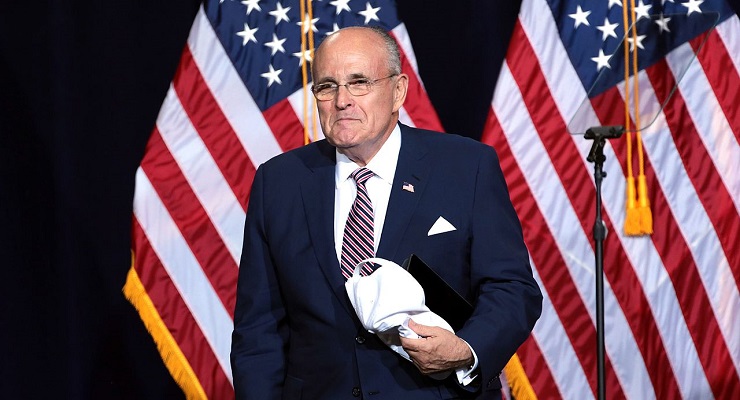
Rudy Giuliani, the president’s personal lawyer, has spoken at two rallies that became riots.
The latest riot, which some also call an insurrection or an act of sedition, is under investigation by federal prosecutors. The rampage happened on Jan. 6, in our nation’s Capitol, after Giuliani called for “trial by combat.”
According to Politico, statements Trump and Giuliani made may be under investigation.
“Federal prosecutors are vowing an aggressive investigation of all those who took part in or instigated the breach and takeover of the Capitol on Wednesday, raising the prospect that inflammatory statements President Donald Trump and Rudy Giuliani made to supporters shortly before the assault will be closely scrutinized for possible criminal charges.” Politico reported.
Two phrases in the above Politico report raise interesting questions. The online publication said that “inflammatory statements President Donald Trump and Rudy Giuliani made to supporters shortly before the assault will be closely scrutinized.”
I hope this happens, although prosecuting people for giving a “combative” speech may be more difficult to do than bringing criminals to account for their behavior before and during the rampage.
That’s where the second phrase in the Politico report comes into play. Federal prosecutors vowed to investigate “all those who took part in or instigated the breach and takeover of the Capitol.”
Great. Words can instigate violence. But communicating with rioters in the days before the attack are clear acts that may help prosecutors prove acts of instigation, if indeed such actions occurred.
That’s why federal sleuths and prosecutors need to learn what Giuliani knew and when he knew it. With whom did he speak? When? What were the subjects of discussion before the Jan. 6 rally-turned-riot? With whom did he communicate after he finished giving his speech? What topics were broached?
Law enforcement officials can get closer to the truth by checking computers, chat rooms and cell phone records. Are there any links between Giuliani and the rioters or the people prosecutors believe led the insurrection?
Lay people like me know that prosecutors “turn” witnesses to build cases. Will the feds squeeze some of the people they arrest to probe whether higher-ups such as Giuliani were involved with more than speech-making?
For context, it’s worth noting that Giuliani has built a reputation for himself as a supporter of police and a strong advocate of law and order. He served a stint as a federal prosecutor before New York City voters made him mayor in the early 90s, when there were more than 2,000 murders a year in the city.
In fact, before he ousted Mayor David Dinkins, Giuliani spoke at a downtown Manhattan rally that turned into a police riot.
“The Mayor also assailed Rudolph W. Giuliani, the probable Republican mayoral candidate, who spoke out against the Mayor at the union rally,” The New York Times reported a day after the Sept. 16, 1992, police riot. “Mr. Dinkins said Mr. Giuliani had egged on the protest irresponsibly for political reasons. ‘He’s clearly, clearly an opportunist,’ Mr. Dinkins said. “He’s seizing upon a fragile circumstance in our city for his own political gain.”
Based on Giuliani’s pattern of behavior, a Washington Post article jumped out at me.
The newspaper reported that “Police officers and at least one police chief from departments across the United States are facing termination, suspension or other discipline for their proximity to or alleged involvement” with the Capitol insurrection.”
This reality ought to give prosecutors the grounds they need to determine whether Giuliani communicated with any of the police officers under investigation and suspicion.
Words spoken by a top Democrat in the House of Representatives also provide grounds for investigators to do a deep dive into the attack on the Capitol.
Rep. James Clyburn, in interviews, said invaders did not approach his office with his name on the door. But they found a secret office where he works, an office that does not display his name on the door.
Clyburn, a veteran lawmaker from South Carolina, wants to know if intelligence was collected and shared with rioters in advance of the riot that left many injured and five people dead, including a Capitol police officer.
According to The Hill, he said, “How did they know to go there? How come they didn’t go where my name was?” Clyburn said. “They went where you won’t find my name, but they found where I was supposed to be. So something else was going on untoward here.”
Law enforcement officers, people who work on Capitol Hill, and even Giuliani have the ability to learn about, or may even know the inner workings of the Capitol. Did anyone share their knowledge with people who ultimately mounted the attack?
Yes, Giuliani gave a combative speech on Jan. 6. Justice Department attorneys have the power to review his speech and consider whether the president’s personal attorney used words to incite violence.
But we also need to know whether Giuliani did more than that. What did he know? And when did he know it? With whom did he speak?
Of course, authorities should not confine their investigation to whether Giuliani communicated with riot revelers.
They also ought to learn if he spoke with late-term Trump appointees at the Department of Defense, Homeland Security and the Department of Justice in the days leading up to the insurrection.
This is another potential fertile ground of investigation because members of Congress have questioned whether the Capitol was secured properly.
After all, Trump and his followers did not hide the fact that they planned to stage a “wild” event in D.C. on Jan. 6 — wild being Trump’s word of choice on his now shut Twitter account.
Incoming Biden administration brass may want to please the boss and “move on” with the business of governing. But protecting our democracy is a sacred act of governing.
We need to know what happened.
We need to see people held accountable for trying to destroy our way of life.
Leave a Reply